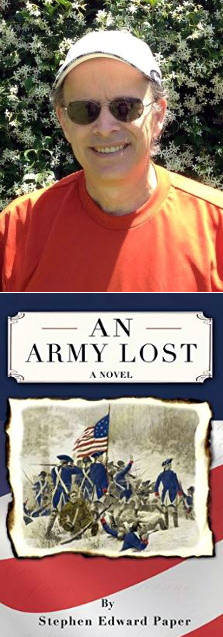|
|
|
|
|
|
|
|
|
|
|
|
|
|

Southern California Tennis Director writes historic post-revolutionary war novel
(The book will be available in 2-4 weeks) |
|
Stephen Paper writes in his Biography on his web site, "I was born in Wadena, a small town in northern Minnesota, where I spent a lot of my early years tying bowlines and trimming deer hides for my dad, reading comic books, shoveling snow, canoeing, scouting and driving my mom crazy while fighting with my two brothers." As a young boy he discovered his love for reading and knew he had to start writing, too. Later in life he discovered another love - sports - and he was able to travel to many exotic countries and play tennis there at the same time. He played for the University of Minnesota and then played the tennis circuits in Asia and Europe and has been coaching ever since. Today Stephen Paper is Head Tennis Professional at the exclusive El Caballero Country Club in Tarzana, California. Stephen Paper labored over five years on the research for his first book "Voices from the Forest: The True Story of Abram and Julia Bobrow." The book describes what it was like to live though one of the most terrible, tragic and darkest periods of human history. This is Abram Bobrow's true story-how he and his wife Julia, who lived through a Nazi firing squad,escaped into the vast forests of western Belorussia, became Jewish partisan fighters and fought back against the Nazis, a unique story of the triumph and indomitabilityof the human spirit. His second book, "Highgate - The last knight of St. John" plays historically in war torn Europe around 1939, when soldiers and best friends Lieutenant Michael Hinton-Smith and Sergeant Jack Cawkins stumble upon an underground burial chamber while on a reconnaissance mission in France. The book describes how the two friends find themselves caught between the horror of war and the terror of the supernatural. I was always interested in literature about the time of the American Revolutionary War. Stephen Paper's book is unique because it covers a military campaign that was not widely known, was not successful, and caused tremendous hardship - and it happened in the early post-Revolutionary War, during George Washington's presidency. Paper states, "With the end of the Revolutionary War the far west beckons to many. Among the homesteaders, farmers, adventurers and former soldiers looking for a new life is Landis James, a veteran estranged from his Philadelphia merchant father, who settles in the Kentucky borderlands." Now comes the conflict, the native Americans are not thrilled seeing all those white people encroaching on their lands ceded to them by treaty. In fact, many tribes see this as an outright invasion. Paper goes on, "In 1791 the British still occupy Forts Detroit, Michilimackinac and Niagara in violation of the Treaty of Paris and see an opportunity to either reclaim the colonies or at the very least, establish a buffer state to protect Canada. Encouraged and armed by the British, the tribes unite to defend their homeland. In 1790, President George Washington sends an army into the wilderness north of the Ohio River to end the “troubles.” The soldiers are routed by a coalition of tribes led by the Miami War Chief, Little Turtle. In 1791, he sends a new army. Landis James, now a captain, heads north with many of his fellow Kentuckians to settle the score." And this "revenge campaign" is the subject of Stephen Paper's historical novel. He calls his book, "...a fictional account based on this little known campaign and the first in the Fallen Timbers Series following the James family into the wilderness and across the seas during the early days of the American Republic." I don't know why it took me a long time to start reading the book. Every time I wanted to I found another more tennis related publication to read or story to cover. I knew that my recent trip to New York City gave me ample time to read it in the airplane and, lo and behold, I could not put it down. "An Army Lost" kept me mesmerized reading about those poor foot soldiers from Kentucky, those bad decision makers in Washington (what else is new?) and those desperate Indians thinking they could teach the white man a lesson so he would never come back into their land. Anyone familiar with the American Revolutionary War and how those military campaigns were run will see how well Paper researched the subject. You can't help identifying with the characters and feel tremendous compassion for them and their fate, fully realizing how he interweaves factual history with his fictional plot. Making the story gripping while always keeping the historical framework in check is no easy task, but Stephen Papers has done just that. When I put the book down I decided to look forward to the continuation of the story with the James family in such a historically important period for the development of the young America. I also decided to try and get my hands on Stephen Paper's other books. If they are only half as thrilling as "An Army Lost" I'll be a happy reader. One more thing: Stephen Paper announced that all royalties from this book for the next year will be going to the San Diego Wounded Warriors Tennis Program. |
 |